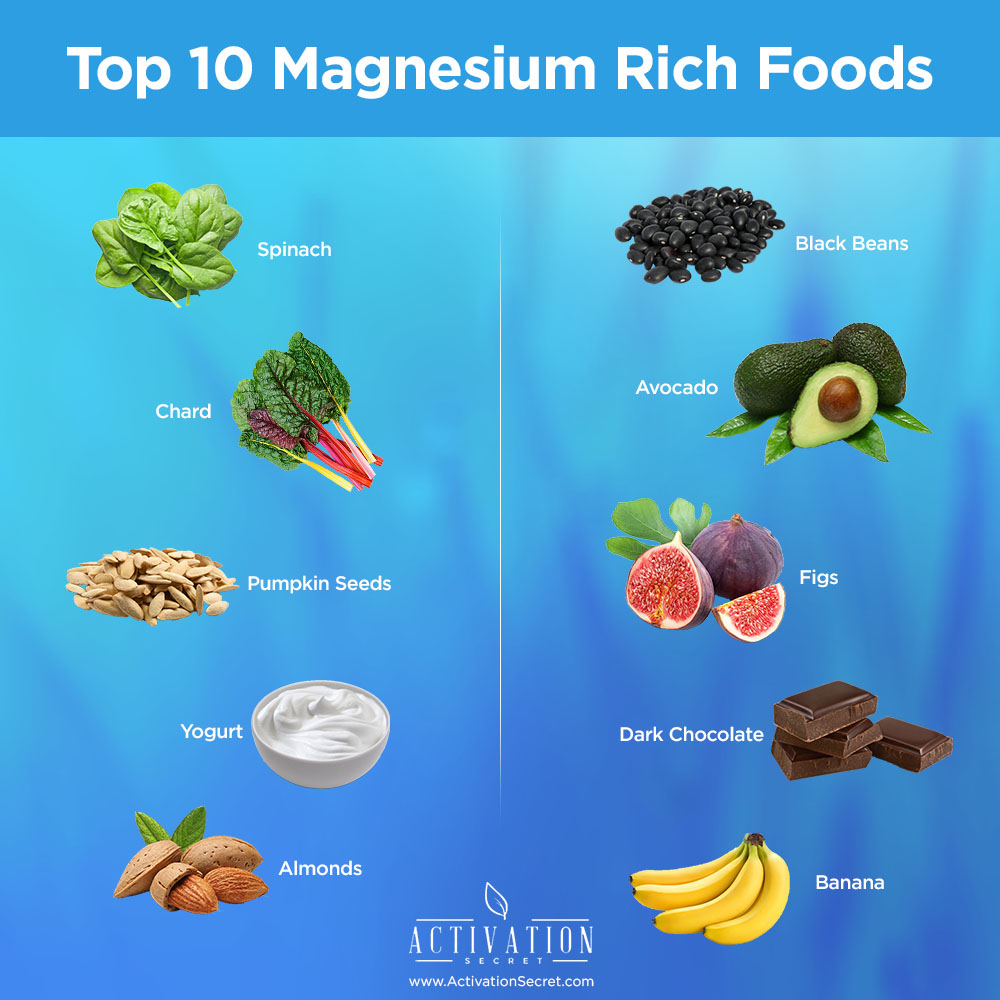Top 21 Magnesium Benefits and Uses

Contents
- 1 Why Do We Need Magnesium in the Body?
- 2 What Are the Health Benefits of Magnesium & Magnesium Supplements?
- 2.1 1. Protects Your Heart
- 2.2 2. Reduces Anxiety
- 2.3 3. Helps with Digestion
- 2.4 4. Eases Muscle Spasms
- 2.5 5. Regulates Other Minerals
- 2.6 6. Reduces PMS Symptoms
- 2.7 7. Enhances Nerve Functioning
- 2.8 8. Prevents Osteoporosis
- 2.9 9. Keeps Teeth Strong
- 2.10 10. Increases Energy Levels
- 2.11 11. Reduces Blood Pressure
- 2.12 12. Aids in Protein Synthesis
- 2.13 13. Keeps Cholesterol in Check
- 2.14 14. Modulates Insulin Sensitivity
- 2.15 15. Regulates Metabolism
- 2.16 16. Reduces Muscle Aches
- 2.17 17. Relieves Constipation
- 2.18 18. Helps with DNA Transcription
- 2.19 19. Makes Metabolic Syndrome Less Likely
- 2.20 20. Improves Asthma Symptoms
- 2.21 21. Boosts Memory
- 3 What Are the Top Foods That Contain Magnesium?
- 4 Frequently Asked Questions
Why Do We Need Magnesium in the Body?
Magnesium is, quite simply, a matter of life or death and that’s why we want to talk further about magnesium benefits and uses.
First, I know that sounds a bit extreme, however, without magnesium, there is no way your body could function normally, and you would eventually die. In fact, several studies have demonstrated that without sufficient quantities of magnesium, sudden death becomes much more likely.
Yikes.
Therefore, it’s crucial that you get enough magnesium in your diet. This can be hard to do so it’s advised that you supplement with the best magnesium supplement possible.
Still not convinced?
What Are the Health Benefits of Magnesium & Magnesium Supplements?
1. Protects Your Heart
Without enough magnesium, your heart is more likely to break down, to become susceptible to heart disease, and to beat irregularly.
On the other hand, regularly supplementing with magnesium can regulate your heartbeat, keep the muscles active and the valves healthy, and protect the vessels that lead to and from the heart.
2. Reduces Anxiety
Many people suffer from anxiety, and more Western people report this symptom than ever before. Magnesium, however, substantially reduces these symptoms, allowing people to sleep better, work more productively and manage their other mental and physical conditions with greater serenity and ease.
3. Helps with Digestion
If you suffer from routine digestive trouble – heartburn, cramps, gas, bloating, stomach pain or other symptoms – getting more magnesium should be the first thing you try. It can help ease these symptoms, promote regular digestion and ensure your entire digestive tract, from mouth to rear, works more efficiently.
4. Eases Muscle Spasms
No matter where they are in the body, muscle spasms are very unpleasant and make, living a normal life difficult. These can affect both limbs and internal organs, and even the tongue. Eating foods high in this mineral or taking regular magnesium supplements can help reduce these symptoms.
5. Regulates Other Minerals
As a macro-mineral, magnesium does heavy-duty lifting in ensuring that other minerals work as they should in your body. For instance, minerals like calcium, potassium, and sodium are crucial to your brain function, your musculoskeletal system, and other vital processes. Magnesium helps with absorption and processing of these minerals.
6. Reduces PMS Symptoms
Premenstrual Syndrome is a condition that affects many women of childbearing age monthly, and they will tell you it’s not fun. Magnesium can lessen common symptoms such as bloating, cramping, breast tenderness and weight gain, and can promote normal cycles. For these effects, combining with B6 helps.
7. Enhances Nerve Functioning
Nerves are crucial to life. They transmit messages from the body to the brain and vice versa, helping us think and live the way we’re used to. Plus, magnesium helps transport sodium and potassium across cell membranes, a crucial function in the brain as well as throughout the rest of the body.
8. Prevents Osteoporosis
Brittle bones are one of the greatest dangers in old age because when they break, they can fail to heal or even lead to infection and death. Keeping bones strong is crucial, and magnesium helps…largely through its encouragement of proper calcium absorption and use in the body.
9. Keeps Teeth Strong
Teeth break down over time, especially when exposed to the high levels of simple carbohydrates – sugars, white flour, white rice and so on – that are so prevalent in our society. Magnesium remineralizes teeth, putting protective enamel back in place and keeping them strong at the root.
10. Increases Energy Levels
Waning energy levels is an occupational hazard of getting older, but it happens even to younger people when they don’t get enough magnesium-rich foods in their diets. Low energy makes it difficult to get through the day and dysregulates sleeping cycles so that you always feel “low.” Magnesium promotes steady energy levels, so you have enough juice to get through the day and sleep well at night.
11. Reduces Blood Pressure
High blood pressure is associated with a range of chronic conditions, such as heart disease and kidney damage, and can interfere with the effectiveness of cancer treatments. Taking magnesium regularly can reduce your blood pressure, so it stays in a healthy range for life, not just when you’re young.
12. Aids in Protein Synthesis
Protein synthesis is crucial to a huge range of bodily processes. Your body uses DNA as the blueprint for making proteins, which it builds according to your gene specifications. To do this, enzymes unwind your DNA in the particular place where a gene is, and your RNA (closely related to DNA) then copies that blueprint. The RNA is the actual pattern copied by proteins, of which there is a huge variety used at different points in the body. When you cannot synthesize protein efficiently, you have trouble healing, maintaining healthy muscle mass and fighting off a range of diseases. Magnesium supports protein synthesis, so you have a better chance of maintaining health and longevity.
13. Keeps Cholesterol in Check
Experts used to say that all cholesterol was bad, but we now understand that only LDL cholesterol is bad, while high HDL cholesterol is good (and help to lower bad LDL levels). Magnesium assists in this process.
14. Modulates Insulin Sensitivity
Insulin sensitivity describes a condition in which your body responds rapidly to sugar in the bloodstream, removing it and reducing your “sugar high” that eventually leads to crashing. Magnesium helps you remain insulin sensitive, as opposed to insulin resistant, in which your body has trouble lowering blood sugar levels, which leads to a range of diseases.
15. Regulates Metabolism
Magnesium also regulates metabolism. Your metabolism is your ability to use macronutrients such as fats, carbohydrates, and proteins efficiently. When you cannot do this, you feel tired, low-energy and hungry rather than energized with a regulated appetite, so getting enough magnesium is crucial.
16. Reduces Muscle Aches
Muscle aches are also a common problem in Western societies. When your body is low on magnesium, these are much more common, sometimes becoming so painful you cannot sleep or work normally. Upping your intake can help provide relief.
17. Relieves Constipation
Nobody likes to be unable to go. Because low levels of magnesium are associated with faulty digestion, it’s no surprise that when you don’t get enough magnesium, you don’t go enough. Taking more magnesium can not only ensure you have bowel movements but also that they’re regular. Magnesium is also known to attract water, which bringing extra water to your digestive system can help loosen and free up stools.
18. Helps with DNA Transcription
DNA transcription means the copying of DNA, which occurs every time your cells divide. Cell division is crucial to healing and health, but it also carries the risk of improper DNA copying… also known as mutation. The mutation causes a range of undesirable conditions, including cancer.
19. Makes Metabolic Syndrome Less Likely
Metabolic syndrome affects a huge number of people in the U.S. and around the world. It is the precursor to a range of “Western” conditions, from stroke to heart disease to diabetes. You can substantially reduce your susceptibility to these diseases by taking regular magnesium supplements, which protect your health, circulatory system and other systems that get compromised in metabolic syndrome.
20. Improves Asthma Symptoms
Asthmatics have difficulty breathing due to constriction in the bronchi of the lungs, small airways that carry oxygen to the rest of the body. During an asthma attack, these airways constrict and fill with mucus, making it hard to breathe. Due to its ability to relax muscles, it can help relax the muscles surrounding bronchi.
21. Boosts Memory
Magnesium, as discussed, is crucial to proper functioning of the brain. This includes memory, both the formation of new memories and the retention of long-term ones. Low levels of magnesium are linked to Alzheimer’s disease and dementia, so taking magnesium from a young age is an excellent way to ward off these conditions.
Now that you know what magnesium does for you and your body, hopefully, you’ll take this vital macro-mineral seriously and make sure to get more of it in your diet today. Your 80-year-old self will thank you, so don’t wait.
What Are the Top Foods That Contain Magnesium?
 Top 10 Magnesium Rich Foods
Top 10 Magnesium Rich Foods
- Spinach
- Chard
- Pumpkin Seeds
- Yogurt
- Almonds
- Black Beans
- Avocado
- Figs
- Dark Chocolate
- Banana
Frequently Asked Questions
Should you be taking magnesium supplements?
While it’s wise to east high-density magnesium foods like the ten listed above you have to realize that for some reasons our food isn’t as high in magnesium as it was in the past.
That’s why it’s important to supplement with a high-quality magnesium supplement so you can be sure you are getting the right amount of magnesium and you are not deficient.
What is the best magnesium supplement?
First, you need to realize that there are a lot of different kinds of magnesium. Below I’ve gone ahead and included a nearly complete list of all the different types of magnesium supplements available.
However, you need to realize that not all magnesium is absorbed the same way. In fact, when you take some of the oral magnesium supplements they only have an absorption rate of 4% or less.
- Magnesium Ascorbate
- Magnesium Aspartate
- Magnesium Bicarbonate
- Magnesium Carbonate
- Magnesium Chloride
- Magnesium Chloride Hexahydrate
- Magnesium Citrate
- Magnesium Fumarate
- Magnesium Gluconate
- Magnesium Glutamate
- Magnesium Glycinate
- Magnesium Hydroxide
- Magnesium Lactate
- Magnesium Lysinate
- Magnesium Malate
- Magnesium Orotate
- Magnesium Oxide
- Magnesium Phosphate
- Magnesium Pidolate
- Magnesium Sulfate
- Magnesium Taurate
That’s why I believe the best magnesium supplement is Ease magnesium spray by Activation Products. EASE is made from naturally pure magnesium chloride hexahydrate (MCH) from The Dead Sea. This is the most absorbable form of magnesium for the human body.
Learn more about Ease magnesium spray here or get a discount on Ease here.
Where do you buy magnesium chloride?
When it comes to where to buy magnesium chloride I’d recommend you look to buy Magnesium Chloride Hexahydrate as we mentioned this is the most absorbable form of magnesium for the human body.
The best place to buy this is from Activation Products here.
What nuts are high in Magnesium?
There are a lot of nuts you can choose from. However, the best nuts and seeds to eat for magnesium are:
- Almonds
- Cashews
- Pumpkin Seeds

